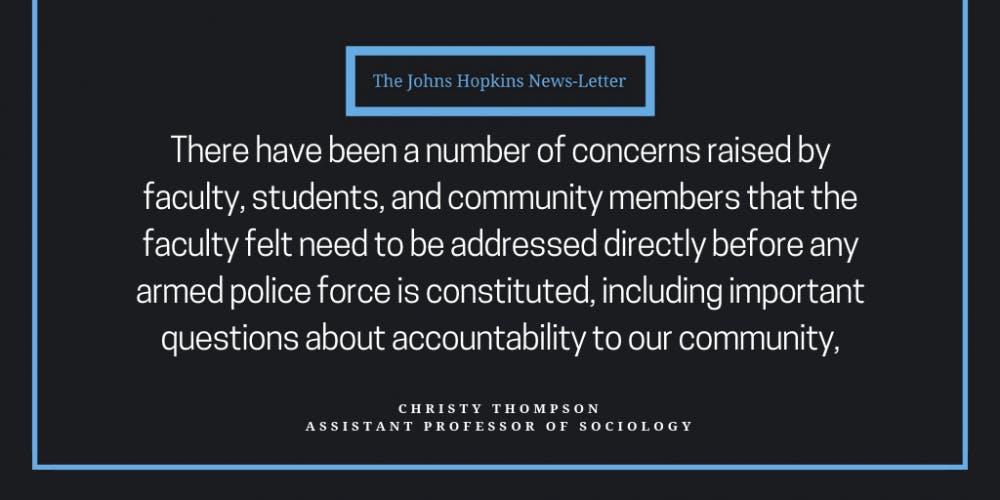On Monday, the Homewood Faculty Assembly (HFA) voted in favor of requesting the University to terminate its initiative to implement a private police force and requesting amnesty for those involved in protesting this initiative. Following the passage of the vote, the HFA sent a written resolution to the University concerning its requests on Tuesday.
Composed of current full-time faculty and faculty emeriti in the Krieger School of Arts and Sciences and the Whiting School of Engineering, HFA is a forum in which faculty meet twice a year to discuss University issues and propose recommendations to the administration through formal written resolutions. These formal resolutions are then sent to the Homewood Academic Council, which includes University President Ronald J. Daniels and Provost Sunil Kumar.
For several faculty, the HFA’s vote and formal resolution come after what they feel has been a consistent lack of transparency from the University.
According to Kristin Cook-Gailloud, senior lecturer and French language program director in the Department of German and Romance Languages and Literatures, the administration has a history of ignoring faculty concerns when making decisions about the University. Recently, this has been reflected in the administration’s support of Senate Bill (SB) 793, also known as the Community Safety and Strengthening Act.
“We felt very uninformed about decisions that were being made, and wish we had been consulted a little bit better,” she said. “There have been some forums organized, and we received a report explaining the validity of this bill including statistics and lots of things, but we always felt as if we weren’t truly asked, and this includes other decisions that have been taken in the past. And so the frustrations are growing because we don’t take part in any decision-making.”
In an email to The News-Letter, Assistant Professor of Sociology Christy Thornton echoed Cook-Gailloud’s sentiments. She added that community members have raised similar concerns.
“There have been a number of concerns raised by faculty, students, and community members that the faculty felt need to be addressed directly before any armed police force is constituted, including important questions about accountability to our community,” she wrote. “In particular, black faculty expressed a feeling that their concerns have not been adequately addressed and that their voices have not been heard by the administration.”
Accordingly, Cook-Gailloud, who is the chair of the HFA, said that holding the vote and sending the resolution was an important part of ensuring that the administration hears faculty voices, especially as more faculty have become proactive about sharing their views.
Drew Daniel, associate professor and director of graduate studies in the Department of English, was present at the meeting and noted the strong agreement among faculty to oppose the police force and uphold the First Amendment rights of students.
“I was present at the Homewood faculty assembly meeting where there was a unanimous expression of opposition to the private police force measure and a strong declaration of support for the actions of the students sitting in,” he said.
Since the passage of the vote, many members of Students Against Private Police (SAPP) at the University have expressed their approval and appreciation for the HFA.
Madeline Wells, a graduate student in the Department of Comparative Thought and Literature, was grateful for the support of the faculty and hoped that the actions of the HFA would galvanize the efforts of student protesters.
“I hope that our demands will be taken seriously and I hope that the faculty support will encourage the administration to take us more seriously,” she said.
The HFA’s vote and formal resolution follow a series of similar collaborations and displays of mutual support between students and faculty, such as the campus-wide walk-out in February against the University’s contracts with ICE and the “Open Letter from Concerned JHU Faculty” against the formation of a private police force.
Evan Drukker-Schardl, a SAPP member, was also grateful for the support of the HFA, and said that many members of SAPP were excited by the vote.
“SAPP has collaborated with professors who have spoken at our rallies and offered their own professional input into policing, the privatization of policing and racial profiling,” he said. “We’ve gotten in touch with professors whose work is on the issue of policing, whose research is connected with the social issue and who can use that research to underscore and develop the activism that is led by students.”
Daniel hopes that in the future, the University will reevaluate their decisions and improve as an institution.
For now, he argues that the University must first come to terms with its accountability to faculty, students and community members.
“We care about our students and we care about their safety,” Daniel said. “But for us the safety question also should lead to a question of accountability for the way that this administration treats those who criticize its actions.”
In due time, Cook-Gailloud hopes that the HFA will be able to build on its current involvement in University issues to foster collaboration between faculty and administrators and positively impact the University.
“Just sincere dialogue. That’s how I see the future of it – about anything that has to do with academic affairs - students, curriculum, anything,” Cook-Gailloud said.
The original version of this article stated that Kristin Cook-Gailloud was only a member of the Homewood Faculty Assembly. She is the chair.





